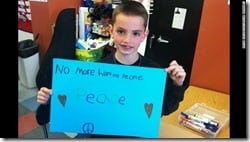Take a bucket full of water. Pour some oil into it, not too much, but enough so that is forms a small blob floating on the surface. Now find a large rock and drop it into the water and oil. What happens? Obviously there is a splash. And if you look down in the bucket, you see lots of smaller blobs of oil. Now sit back and wait. Eventually, the blobs will all coalesce into one big blob again.
This week, society was once again marred by evil at the Boston Marathon. As of this writing, we do not know if it was the evil acts of one individual or many. A big rock was dropped into a bucket of oil and water. A single, violent, tragic event tore apart the calm. But watch, in the horror, stories of survival and heroics emerge. And society joins together to condemn these evil acts, prays for those effected and strengthens as a whole to become better.
Is the World Evil?
When I talked to my oldest daughter about the events in Boston, she was shocked. Hearing the bombs go off on the radio gave us both chills and prickly goose bumps. I really wasn’t sure what to say. One never really does. As a parent, our duty in life is to protect, nurture, educate and love. It is difficult yet incredibly rewarding. But when that rock is thrown and the water is splashed and the oil separated, how do you talk about this with your children.
I asked my daughter if she thought that the world was more evil or more good. Her answer saddened me. She said evil. I felt it my duty as a parent to understand why she thought that way and hopefully change her outlook. She told me that we only hear about the bad things that happen in the world – the war, the violence, the hatred. I agreed with her. As a society, we tend to put more focus on evil acts. But as we drove through San Francisco, I pointed to a line of people forming near City Hall. We drive passed this spot regularly. I asked her what they were doing. She knew because we had talked about it before. It was a food line where volunteers regularly hand out food to those in need. “Is that not good?” I asked. She said that it was. Often, the acts of good go unnoticed or with little fanfare, I explained, it is important to recognize those people or organizations who bond together to do good things for society.
A little bit later on our drive, an NPR story talked about the Turnaround Arts Initiative (funded in part by the government) where corporations are donating money or goods to schools to foster art and music in challenged schools in an attempt to try something different to prevent dropouts and raise scores. See, I said, here is another story of good in society. Of course it was sandwiched between coverage of the Boston Marathon bombings.
Coping with Evil
I’m not a psychologist, nor even pretend to come anywhere close of being able to address and overcome issues that confront humans day in and day out. We all have our share of stress, hardships, and pain, each to varying levels. And, unfortunately, evil walks among us. We cannot live in a bubble. We have to think for ourselves. And we have to act accordingly. So when evil does strike us, directly or indirectly, we need to be prepared to react and talk about it.
Watching events unfold in Boston, and late last year at Sandy Hook Elementary, and countless other violent evil acts simply makes me sick to my stomach. As a parent, I’m paralyzed, and as a human, I’m astonished. But as the ripples die down and the oil coalesces once again, I realize that this world is not evil. As a society, we are good people. Sometimes we need to convince ourselves of this, especially after these evil acts; other times, we simply know and feel the good without doing anything.
When talking to your children about evil, it’s important to provide balance. Unfortunately, in our society, it’s the evil acts that get the most attention, and the good ones that are overlooked. This is important. Tell your children this. There are thousands or millions more good doers than evil doers in this world. And every person can make a conscious choice to make a difference. If you provide the love and support and encouragement to your kids, they will be stronger and hopefully kinder people as they mature. If you need to dumb it down to them, tell them how smiling takes fewer muscles than frowning and that laughter is healthier for you than yelling in anger (and remember that yourself before you freak out over some little thing you kid did wrong).
Embrace the Good
Think about your daily life. A smile to a stranger takes no effort, but has a lasting effect. Hold a door for someone who has their hands full. Slow down a bit and look around you. Get off of your devices and gadgets and enjoy the beauty around you. Say “thank you” to people who do something kind for you. And teach your kids how to do this. Help them learn how to embrace the good that provides cohesion in our society and makes us stronger as a result.

While rocks are thrown, the oil eventually joins back together as a whole. Share your happiness and joy. It will overcome those few voices and actions of evil. Make a difference!
HTD says: Learn from evil acts but embrace the good values of society and foster that nurturing element in your children.



